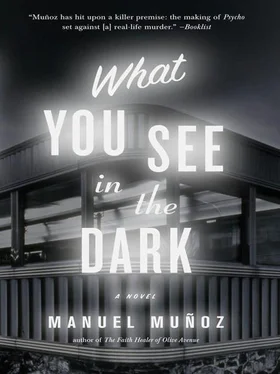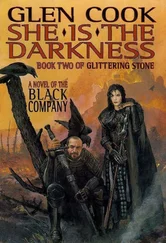“That’s a big hunk of pie,” said one of the girls. She puffed on her cigarette. “Is Farmer Jones staying through lunch?”
“If it’s for Cal, I’ll serve it to him,” said another.
“You girls hush before your voices carry,” Arlene admonished them. She walked out with the cherry pie and set it before Vernon Jones, who nodded his thanks. Cal remained concentrated on his newspaper, unaware of both Arlene and the sneaking glances of the younger waitresses peering through the round window of the swinging kitchen door. He wasn’t an unattractive young man — studious and hardworking, as most of the farmers’ sons tended to be — but it would take a few more years until he grew into the rugged assurance of someone like Vernon Jones. Cal was the same age as her own Dan, but her son’s demeanor and confidence were years past Cal’s — qualities she had seen her son grasp from a very young age, when as a little boy he had received the cooing attention from the other waitresses whenever she brought him along to pick up a paycheck. He’d been lanky as a teenager, but that hadn’t stopped the attention from becoming downright embarrassing, to the point that she’d asked Dan not to bring his dates to the café.
These days, he’d been seen around town with the Mexican girl who worked over the shoe store. Some of the dimmer young waitresses made mention of Dan’s lunch with his young date, not noting the displeasure on Arlene’s face, but she made herself look busy and ignored the comments. She knew any of the waitresses would scramble to get to his table, even with her on watch, but Dan had been sensible enough to understand that he wasn’t to bring that girl around while she was working.
Vernon ate his cherry pie with contentment, taking a side glance out to the sidewalk. He appeared in no hurry, but he also kept his head bent, and Arlene engaged him no further in conversation. Cal kept reading every last line of the local news and even flipped back to the front page to start the task all over again. Lunch was approaching, but for the time being, Arlene let the girls in the back hover around their Modern Screen while she prepped some of the tables for the lunch rush.
When the man and the woman walked in, Arlene noticed first the woman’s brilliant yellow blouse. It was difficult not to think of the deep yellow tucked in the corner of a children’s drawing, an extraordinary sun, and she knew instantly that this woman was not from town. Even at a distance, she could tell the blouse was expensive.
“A table?” the man said when Arlene stood looking at them, a cleaning rag in hand.
“Yes,” she answered. “This way, please.” She pointed them to a booth she had just cleaned, holding the cleaning rag behind her back as she reached to the counter for two menus.
“Is it too late for breakfast?” the man asked.
“Not at all,” Arlene said. “I’ll get you both some coffee.”
“Tea for me,” said the woman.
“Yes, ma’am.”
When Arlene walked away, the woman’s voice lingered with her, its lilt and melody. The woman had looked up, just briefly, but it was only now, back in the kitchen, that Arlene set down two cups and realized the woman was not from the town at all. She looked over at the other waitresses, still not bored with their Modern Screen, and it was when she saw the magazine cover that she thought of that other world over the mountains, over in Los Angeles, and knew that the woman had come from there. She wondered if the girls would’ve recognized the woman the minute she opened the door.
Her realization unspooled an unease. She had a habit of watching cups and glasses when they were filled to their tops, trying to walk as smoothly as possible so none of the liquid would spill over and make a mess. But this time, heading back to the table, the brightness of the woman’s yellow blouse brought Arlene to near distraction, and she had to set the cups down on the counter before the couple could see, and swipe the edges clean where some of the tea had spilled. The couple didn’t notice her and neither did Vernon or Cal, whose backs were turned to the booths. Vernon, in fact, was rising and reaching for his wallet to pay his familiar tab.
“Bye, now,” Vernon said, and stepped out the door, just as Arlene was setting the cups down. She was too focused on setting them down and not spilling again that by the time she could raise her head to return his good-bye, the door had already closed.
“What can I get you?” she asked. Without hesitation, the man ordered a full breakfast, but the woman took her time, her eyes down on the menu, and while she did so, Arlene looked closer at her yellow blouse. It was made of silk, right down to the round crafted buttons.
“Just toast and tea,” the woman said.
Arlene didn’t bother to write it down and took their menus. “Pardon me,” she said, “but does anyone ever tell you that you look like—”
The woman interrupted her with a wave of her hand and a shy, almost nervous smile. “Oh, no! Not in the least.”
“You mean no one tells you?”
“No, I mean I don’t think I look like her at all.”
Cal turned around in the commotion, and the woman gave him a glance but brought her eyes right back to Arlene. She held them there, smiling politely, but offered no response. She wouldn’t take her eyes off Arlene. Finally, she asked, “Is there something wrong?”
“No, ma’am,” said Arlene. But as she walked away, she muttered, “The spitting image,” regretting it instantly. The words came out low, almost under her breath, maybe even with a note of unintended hostility — here was the perception about her all over again, the way she carried herself, but now with people who didn’t even live in the city. She wasn’t a mean, cheerless person at all, just exhausted, unable to summon the spirited smiles of the young waitresses, the way they pitched their voices high and loud and sunny, always enough to turn a whole table of men deep in conversation to answer back. It was difficult to balance her tone or the need to smile, like trying to remember to correct her posture, trying to stand straight as a dancer.
She could hear Cal swivel the stool, back to his paper, as she made her way back to the kitchen to hand in their order. The girls had finished both the magazine and the cigarettes and had been busy standing around. When one of them saw Arlene, the girl pulled her hip away from the counter and slung her apron off her shoulder to get back to work. Arlene wished she wouldn’t — she’d see the couple out at the table — but in pretending to look rushed, she prompted the girl to hustle even more.
“Hey,” the girl said, looking through the door’s round window, “that’s my station.”
“I don’t mind, Priscilla,” said Arlene.
“I didn’t go over my break or anything,” said Priscilla. “It’s not like I was late.”
“I’ll throw you the tip,” said Arlene.
“He’s handsome,” said Priscilla. “How come the men in town don’t dress like him?”
The cook rang the bell and pushed over the man’s breakfast plate.
“He’s a big eater,” said Priscilla, and before Arlene could stop her, she grabbed his plate and scurried toward the door, giggling at Arlene as she passed through.
The woman’s toast came next, and Arlene cut two small squares of butter as quickly as she could, rushing out to the table. As she’d guessed, Priscilla must have recognized the woman’s face right away: she stood with her hand on her hip, her mouth open in a wide, disbelieving smile as the woman shook her head.
“Your toast, miss,” said Arlene. “Thanks, Priscilla. Is there anything else we can get you?”
“No, ma’am, we’re fine,” said the man, raising his utensils and holding them over the plate.
Читать дальше












